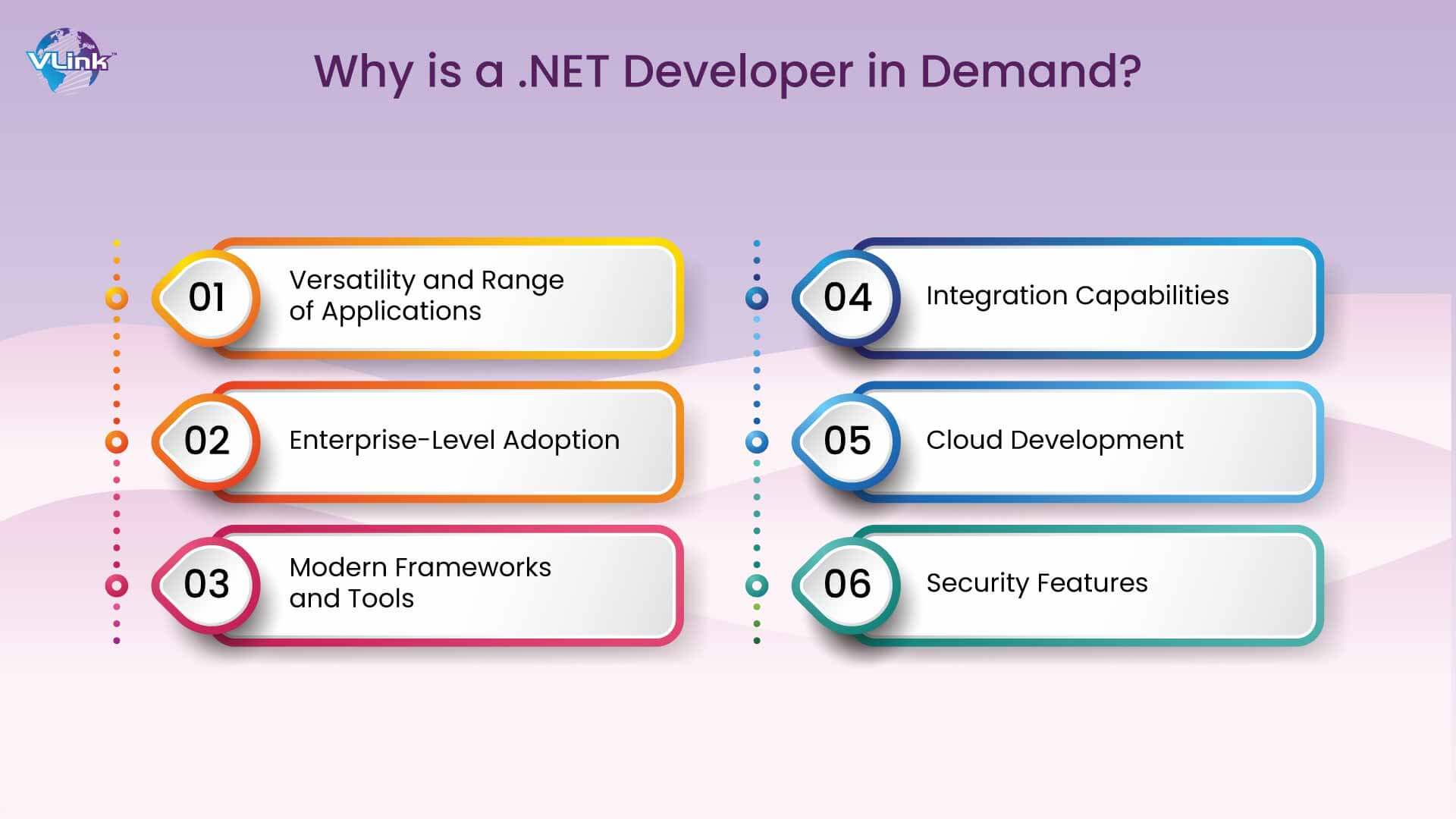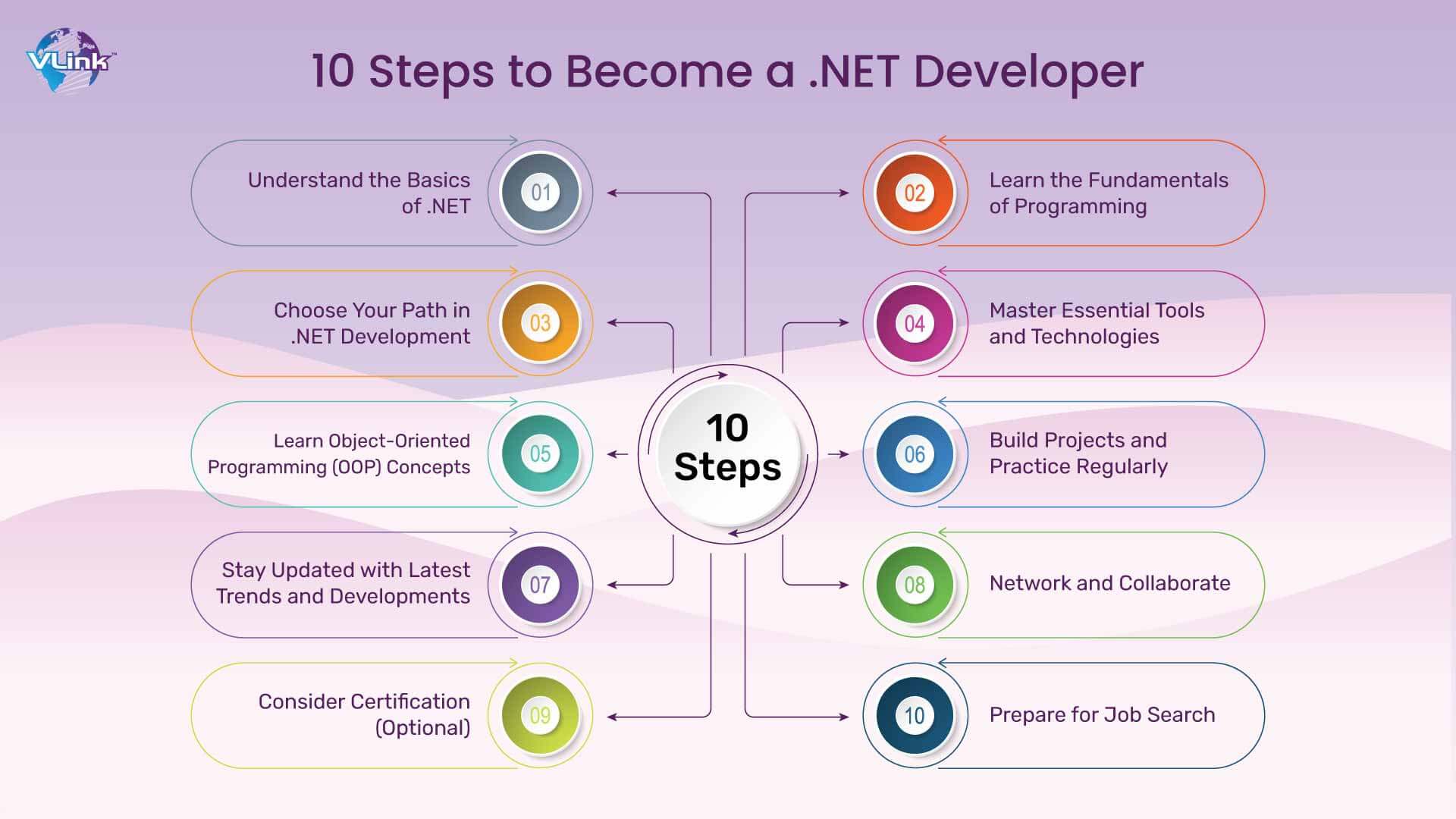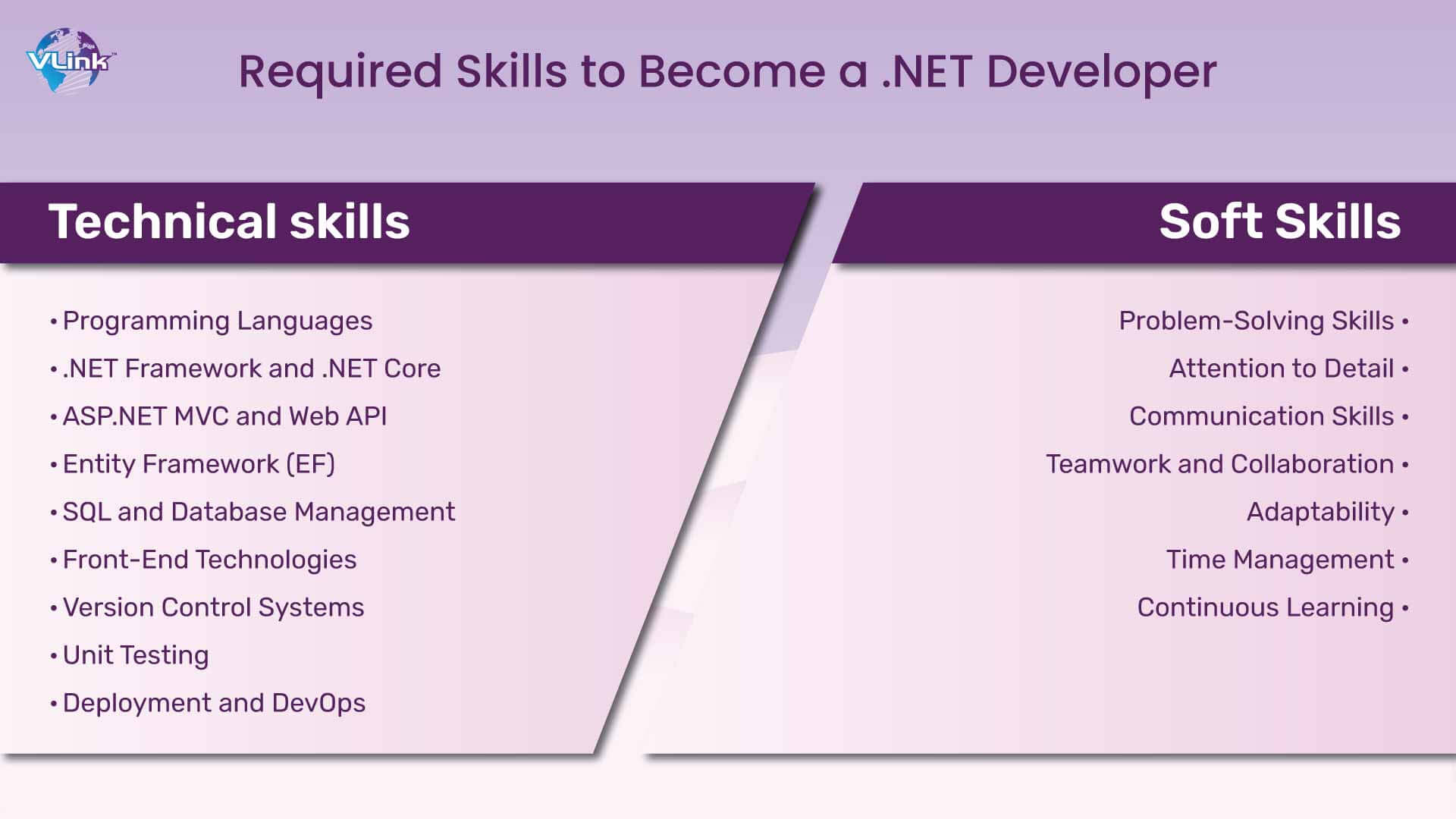Becoming a .NET developer can open a world of opportunities in the dynamic field of software development. These professionals design and build web, mobile, and desktop applications for businesses.
Whether you're just starting or looking to switch careers, this guide will explain how to become a .NET developer, as well as the skills and qualifications. In addition, we will explore the average salary of a .NET developer.
Why is a .NET Developer in Demand?

Here are several reasons why Dot NET developers are in demand:
- Versatility and Range of Applications: .NET is a versatile framework that can be used to build a wide range of applications, including web, desktop, mobile, cloud-based, gaming, and IoT applications. This versatility makes .NET developers valuable across many industries. Many established businesses prefer to hire Dot NET developers in the United States.
- Enterprise-Level Adoption: Many large enterprises use .NET for their critical applications due to its robustness, scalability, and security. As a result, there is a steady demand for developers who can maintain and enhance these systems.
- Modern Frameworks and Tools: With the introduction of .NET Core open-source (now .NET 5 and later), the framework has become cross-platform, allowing developers to build applications that run on Windows, macOS, and Linux. This modernization has expanded the potential use cases and increased the demand for .NET developers.
- Integration Capabilities: .NET easily integrates with other technologies and platforms, making it an ideal choice for companies looking to connect their systems with various external services and APIs.
- Cloud Development: With the increasing adoption of different types of cloud computing services, .NET has become integral to many cloud-based solutions, especially with Microsoft's Azure platform, which offers extensive support for .NET applications.
- Security Features: .NET includes built-in security features, such as code access security, role-based security, and cryptography, which are crucial for developing secure applications.
What are the Roles & Responsibilities of .NET Developers?
- Writing clean, scalable, and efficient code using .NET languages (C#, VB.NET), frameworks (ASP.NET, .NET Core) and ASP.NET Core 6.0 features and upgrades.
- Designing application architecture, choosing frameworks and libraries, and collaborating with system architects to ensure the application meets architectural standards.
- Writing unit tests and conducting integration testing to ensure the robustness and reliability of applications.
- Identifying and fixing bugs, performance bottlenecks, and issues in existing software applications.
- Creating technical documentation for reference and reporting.
- Working closely with other developers, designers, and stakeholders to meet product requirements.
- Deploying applications and systems into production environments.
- Staying updated with the latest technologies and industry trends to improve skills and knowledge continuously.
- Implementing security measures and best practices within the application, such as data encryption and secure authentication.
- Optimizing application performance through code refactoring, database tuning, and other techniques.
- Using version control systems (e.g., Git) and collaborating in DevOps processes for continuous integration and deployment (CI/CD).
- Analyzing technical issues and providing solutions in a timely manner.
Overall, .NET developers play a crucial role in the software development lifecycle, from initial concept and design to deployment and maintenance, ensuring that applications are efficient, reliable, and scalable.
Steps to Become a .NET Developer

Here are ten steps on how to become a .Net Developer:
Step 1: Understand the Basics of .NET
.NET is a versatile framework developed by Microsoft for building various types of applications, including web, mobile, desktop, and cloud-based solutions. It supports multiple best programming languages such as C#, F#, and VB.NET, making it a powerful tool for developers.
Step 2: Learn the Fundamentals of Programming
Before diving into .NET, it's crucial to have a solid foundation in programming concepts such as variables, data types, control structures, and algorithms. Languages like C# (pronounced C-sharp) are commonly used with .NET, so familiarizing yourself with its syntax and principles is beneficial.
Step 3: Choose Your Path in .NET Development
.NET offers different paths depending on your interests and career goals:
- Web Development: Focuses on building web applications using ASP.NET and technologies like MVC (Model-View-Controller) or Blazor.
- Desktop Development: Involves creating Windows-based applications using technologies like Windows Forms or WPF (Windows Presentation Foundation).
- Mobile Development: Utilizes Xamarin to develop cross-platform mobile applications.
- Cloud Development: Involves using Azure and .NET to create scalable cloud applications.
Step 4: Master Essential Tools and Technologies
To become proficient in .NET development, familiarize yourself with essential tools and technologies:
- Integrated Development Environment (IDE): Visual Studio is the primary IDE for .NET development, offering powerful features for coding, debugging, and deploying applications.
- Version Control: Learn Git to manage your codebase and collaborate with other developers.
- Database Management: Understand how to integrate databases with .NET applications using technologies like Entity Framework or ADO.NET.
Step 5: Learn Object-Oriented Programming (OOP) Concepts
Object-Oriented Programming is fundamental to .NET development. Understand concepts such as classes, objects, inheritance, polymorphism, and encapsulation, as they form the backbone of C# programming and .NET development.
Step 6: Build Projects and Practice Regularly
Apply your knowledge by building projects that interest you or mimic real-world scenarios. This hands-on experience not only reinforces your learning but also enhances your problem-solving skills and creativity.
Step 7: Stay Updated with Latest Trends and Developments
Technology evolves rapidly, so staying updated with the latest .NET features, frameworks, and best practices is essential. Follow blogs, participate in forums, join developer communities, and attend webinars or conferences to expand your knowledge.
Step 8: Network and Collaborate
Networking with other developers can provide valuable insights, job opportunities, and collaborations. Engage with the .NET community through platforms like GitHub, Stack Overflow, LinkedIn groups, and local meetups.
Step 9: Consider Certification (Optional)
While not mandatory, obtaining certifications such as Microsoft Certified: Azure Developer Associate or Microsoft Certified: .NET Developer can validate your skills and enhance your credibility in the job market.
Step 10: Prepare for Job Search
Create a strong resume highlighting your .NET skills and projects. Practice technical interviews focusing on .NET concepts, problem-solving, and coding exercises. Consider applying for internships or junior developer positions to gain practical experience.
What Skills are Required to Become a .NET Developer?

Becoming a proficient .NET developer requires a combination of technical and soft skills. Here’s a breakdown of both:
Technical Skills:
- Programming Languages: Proficiency in C# is essential as it is the primary language used in .NET development.
- .NET Framework and .NET Core: Understanding the fundamentals of .NET Framework and .NET Core (now .NET 6) is crucial. This includes knowledge of libraries, APIs, and runtime environments.
- ASP.NET MVC and Web API: For web development, familiarity with ASP.NET MVC (Model-View-Controller) and ASP.NET Web API is necessary.
- Entity Framework (EF): Knowledge of Entity Framework for database interaction and ORM (Object-Relational Mapping).
- SQL and Database Management: Skills in SQL (Structured Query Language) for database querying and management and understanding of relational database concepts.
- Front-End Technologies: Depending on the role, familiarity with front-end technologies such as HTML, CSS, JavaScript, and frameworks like Angular or React can be beneficial.
- Version Control Systems: Proficiency with Git or other version control systems for collaborative development.
- Unit Testing: Understanding of unit testing frameworks like NUnit or xUnit for ensuring code quality and reliability.
- Deployment and DevOps: Basic knowledge of deployment processes and familiarity with DevOps practices can be advantageous.
Soft Skills:
- Problem-Solving Skills: Ability to analyze complex problems and devise effective solutions using .NET technologies.
- Attention to Detail: Writing clean, maintainable code and paying attention to performance optimization.
- Communication Skills: Effective communication with team members, stakeholders, and clients, especially when discussing requirements, explaining technical solutions, or participating in code reviews.
- Teamwork and Collaboration: Working effectively in a team environment, sharing knowledge, and contributing to shared codebases.
- Adaptability: Willingness to learn about new technologies and adapt to changing requirements and industry trends in .NET development.
- Time Management: Ability to manage time effectively to meet project deadlines and milestones.
- Continuous Learning: Given the rapid evolution of .NET technologies, a commitment to constant learning and staying updated with the latest advancements is crucial.
Developing both technical expertise and soft skills will not only make you a proficient .NET developer but also enhance your overall effectiveness and career prospects in the field.
How Long Does It Take to Become a .NET Developer?
Becoming a proficient .NET developer typically takes several months to a few years, depending on prior programming experience and learning pace. Beginners may need 6-12 months to grasp fundamental concepts like C# programming, .NET Framework, and basic web development with ASP.NET.
Mastery, including advanced topics like Entity Framework, MVC architecture, and deployment strategies, can require an additional 1-2 years of dedicated learning and hands-on practice. Continuous education to keep up with updates in .NET Core or .NET 6, along with refining soft skills like teamwork and problem-solving, ensures ongoing growth as a .NET developer.
The Average Salary of .NET Developers
The average salary of .NET developers varies widely based on location, experience, and specific skills. In the United States, salaries typically range from $70,000 to over $120,000 per year, with factors like industry demand and specialization influencing earnings.
Here is the average salary of Dot NET developers based on experience levels:
- Entry-level (0-2 years): Approximately $60,000 - $80,000 per year.
- Mid-level (2-5 years): Around $80,000 - $100,000 per year.
- Senior-level (5+ years): Typically, $100,000 - $120,000+ per year, with variations based on location and specific expertise.
What is the Future Scope of Dot NET Developers?
The future career scope for a .NET developer is promising, given the continuous advancements in technology and the growing demand for skilled developers in various industries. Here are some key factors contributing to the positive career outlook for .NET developers:
#1 - Broad Industry Demand
.NET developers are in demand across a wide range of industries, including finance, healthcare, education, e-commerce, and entertainment. Many enterprises rely on .NET to develop scalable and robust applications.
#2 - Versatility of the .NET Platform
The .NET platform supports multiple languages (C#, F#, VB.NET) and a variety of applications, including web, desktop, mobile, cloud, IoT, and gaming. This versatility ensures that .NET developers can work on diverse projects and stay relevant in the job market.
#3 - Microsoft's Ongoing Support and Innovation
Microsoft continuously invests in the .NET ecosystem, ensuring its evolution with new features, performance improvements, and support for modern development practices. The introduction of .NET Core (now .NET 5 and beyond) has made the framework cross-platform, enhancing its appeal and usability.
#4 - Cloud Integration
With the growing adoption of cloud computing, .NET developers skilled in Azure (Microsoft's cloud platform) are highly sought after. Azure integration allows developers to build, deploy, and manage applications efficiently in the cloud.
#5 - Open-Source Contributions
The .NET ecosystem has a strong open-source community, particularly with the advent of .NET Core. This open-source approach fosters innovation, community contributions, and broader adoption, ensuring the framework's longevity and relevance.
#6 - Future-Proof with .NET 6 and Beyond
Microsoft's unified platform strategy with .NET 6 and future versions aims to provide a consistent development experience across different types of applications (web, mobile, desktop, cloud). This strategic direction ensures that .NET remains a future-proof choice for developers.
The Final Thought!
Becoming a .NET developer requires dedication, continuous learning, and hands-on practice. By following these steps and maintaining a passion for learning, you'll be well-equipped to embark on a successful career in .NET development. Embrace challenges, stay curious, and enjoy the journey of becoming a proficient .NET developer!
If you are a startup owner or prefer to learn coding for your project, I recommend you hire Dot NET developers from VLink. We will help you find and hire the top 3% of experts within 48 hours.
To build a Dot NET team for your development project, contact us!
Frequently Asked Questions
Yes, .NET offers a promising career with ample job opportunities due to its widespread use in enterprise software development, web applications, and cloud computing. Continuous updates and Microsoft's support ensure relevance, making it a solid choice for aspiring developers.
Being a .NET developer means specializing in Microsoft's framework for building applications across various platforms, utilizing languages like C#, F#, and VB.NET to create robust, scalable, and efficient software solutions.
Choosing between .NET and Java depends on your career goals and project requirements. .NET is ideal for Microsoft-centric environments, enterprise applications, and azure cloud integration. Java is versatile and used widely in web development, Android apps, and large-scale systems across different platforms.














